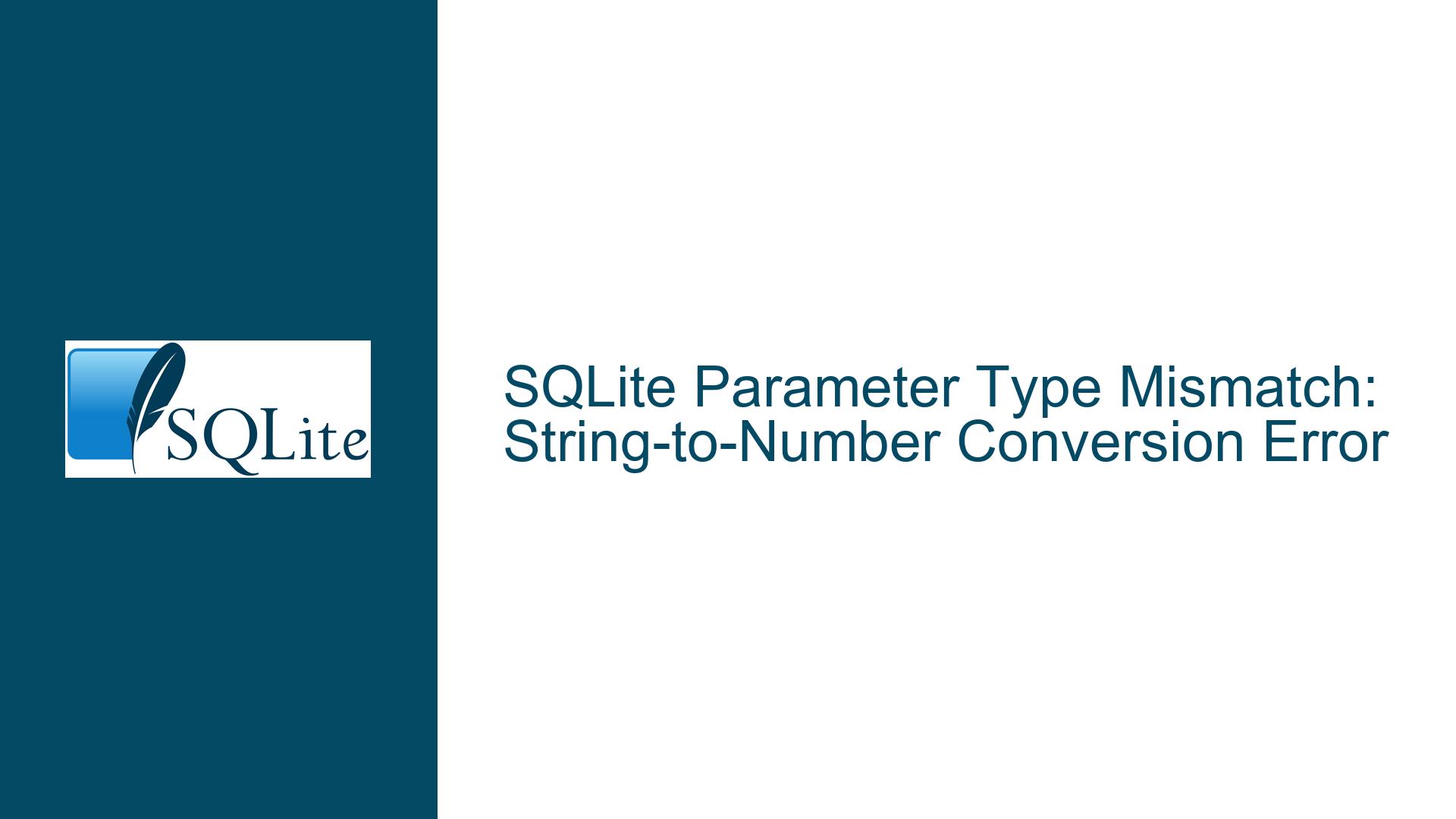SQLite Parameter Type Mismatch: String-to-Number Conversion Error
Issue Overview: String Parameter Incorrectly Interpreted as Integer
The core issue revolves around a parameterized SQL query in SQLite where a string parameter is being incorrectly interpreted as an integer, leading to a runtime exception. The error message, "Input string was not in a correct format," indicates that the SQLite library is attempting to convert a string value ("Magento") into a numeric type, which is not possible. This mismatch occurs during the binding of parameters to the SQL query.
The query in question is designed to retrieve data from a table named Standard_Pattern_EAN based on two parameters: @font (a string) and @DOS (an integer). The table schema defines SP_Font as a TEXT column and SP_Position_DOS as an INTEGER column. Despite the correct schema definition, the parameter binding process fails because the @font parameter is being treated as an integer (Int64 or UInt64) instead of a string (TEXT or NVARCHAR).
The root cause of this issue lies in the way the parameters are being added to the SQLiteCommand object. Specifically, the use of (DbType)SqlDbType.Text in the parameter definition is incorrect. This cast results in the DbType being set to UInt16, which is not compatible with the TEXT data type expected by the SP_Font column. This mismatch causes the SQLite library to attempt an invalid conversion, leading to the observed exception.
Possible Causes: Incorrect Parameter Type Casting and Legacy Code Reuse
The primary cause of this issue is the incorrect casting of the parameter type when adding the @font parameter to the SQLiteCommand object. The use of (DbType)SqlDbType.Text is problematic because it results in the DbType being set to UInt16 instead of the expected String or Text. This incorrect type assignment causes the SQLite library to misinterpret the string parameter as an integer, leading to the conversion error.
Another contributing factor is the reuse of legacy code originally written for SQL CE (Compact Edition). SQL CE and SQLite have different type systems and parameter binding mechanisms. The legacy code was likely designed with SQL CE’s type system in mind, which may not be directly compatible with SQLite. This incompatibility can lead to subtle issues, such as the one observed here, where the parameter types are not correctly mapped to the SQLite data types.
Additionally, the use of SqlDbType in the parameter definition is unnecessary and incorrect when working with SQLite. SQLite uses a dynamic type system where data types are associated with values rather than columns. This means that the type of a value is determined by the value itself, not by the column it is stored in. As a result, the SqlDbType enumeration, which is specific to SQL Server, is not applicable to SQLite and can lead to type mismatches when used incorrectly.
Troubleshooting Steps, Solutions & Fixes: Correct Parameter Type Definition and Code Refactoring
To resolve this issue, the parameter type definition must be corrected to ensure that the @font parameter is treated as a string (TEXT or NVARCHAR) rather than an integer. This can be achieved by using the appropriate DbType enumeration value when adding the parameter to the SQLiteCommand object.
The first step is to remove the incorrect cast to (DbType)SqlDbType.Text and replace it with the correct DbType.String enumeration value. This ensures that the @font parameter is correctly interpreted as a string by the SQLite library. The corrected parameter definition should look like this:
selectCmd.Parameters.Add("@font", DbType.String);
This change ensures that the @font parameter is correctly mapped to the TEXT data type expected by the SP_Font column in the Standard_Pattern_EAN table.
Next, it is important to review and refactor any legacy code that was originally written for SQL CE. This includes ensuring that all parameter definitions are compatible with SQLite’s type system and that any SQL CE-specific constructs are replaced with their SQLite equivalents. This may involve updating the parameter binding logic, modifying the SQL queries, and testing the application to ensure that it works correctly with SQLite.
In addition to correcting the parameter type definition, it is also recommended to validate the data types of all parameters before executing the query. This can be done by checking the DbType property of each parameter and ensuring that it matches the expected data type for the corresponding column in the database. This validation step can help catch any type mismatches early and prevent runtime errors.
Finally, it is important to ensure that the SQLite library being used is up to date. The issue described here was observed with version 1.0.118 of the System.Data.SQLite library. Updating to a newer version of the library may resolve any bugs or issues related to parameter binding and type conversion.
In summary, the key to resolving this issue lies in correctly defining the parameter types and ensuring that the code is compatible with SQLite’s type system. By removing the incorrect cast, refactoring legacy code, validating parameter types, and updating the SQLite library, the issue can be effectively resolved, and the application can function as intended.






